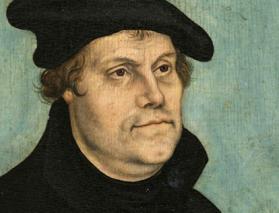Robert McAfee Brown summarizes The Spirit of Protestantism as “an openness to the judging and renewing activity of the living God made known in Jesus Christ.” It’s a willingness to “submit to the corrective activity of God,” and “to live at risk.” Protestantism claims that it’s only in “constant renewal at the hand of God that . . . the life of the church [exists]” (40-1).
Brown thinks this the key difference between Roman Catholicism (and we might add Orthodoxy) and Protestantism. While Roman Catholics are open to reform within the church, a Catholic would say that “the church does not need reformation in any basic sense” since its dogmas are infallible and irreformable. Brown was writing before Vatican II, and he doesn’t make any reference to Congar’s great work on true and false reform. Whether he’s fair to Catholicism or not, I think he does capture the energy of Protestantism, which “affirms that the church must be shaken, judged, purged, and re-made. . . . The church is the place where God’s judgment is most severe” (45).
He goes on to enumerate the various ways Protestants cease to breath the spirit of Protestantism. We “show a phenomenal resistance to institutional change,” for instance, and vicious resistance to the possibility that some other Christian tradition might contribute to our reformation: “Demonination A will argue that its conception of the ministry must not be ‘compromised’ (although denomination B could surely profit by extending its conception of the ministry to include those benefits which denomination A alone possesses). But for denomination B to make ant such concession would be, as its adherents say, ‘a betrayal of our precious heritage.’ And so the battle rages. The stalemate remains. The church stands still” (46). Brown was writing in the early 60s, but the situation hasn’t gotten much better.
Another area of un-Protestant stagnation is on social and economic questions. Brown observes that “Protestantism has been remarkable uncritical of the economic systems in which it has lived.” He’s not offering a judgment about western capitalism, but pointing to something more fundamental, the church’s “complacent unconcern about whether or not western capitalism stands in need of judgment.” Here, as elsewhere, Protestantism has largely decided that “the Reformation shall not continue” (47).















